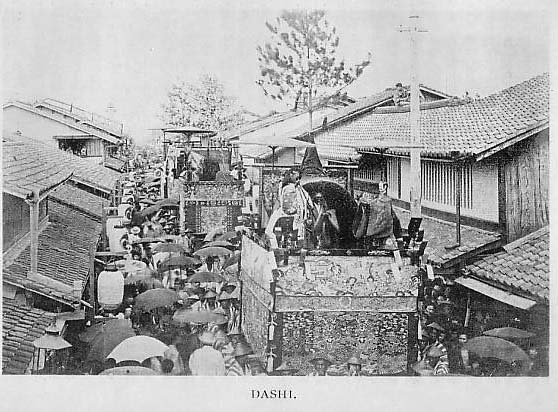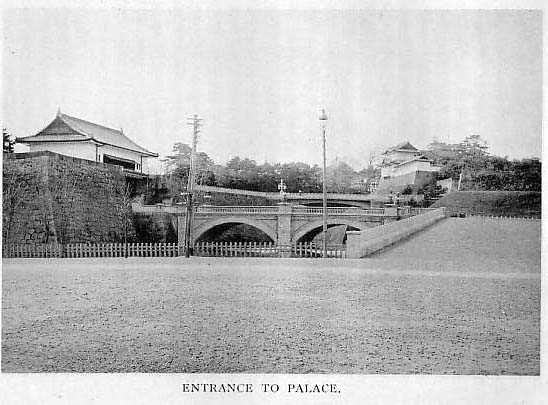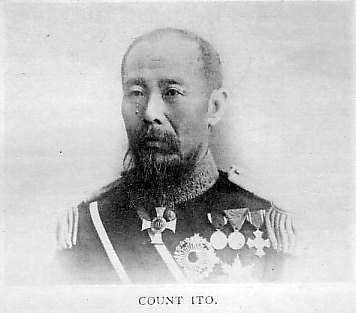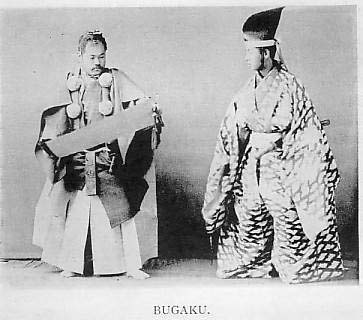The Birthday of a Constitution
Tokio, February 16th, 1889
For every reader of The Times who has seen Japan, there must be hundreds who have not; and even of the lucky minority none but those present on the 11th instant can have experienced public Japanese rejoicings on any scale at all comparable with that which was then called forth in this capital, in honour of the Birthday of the Constitution.
At first the weather threatened ruin to every preparation and hope.
A snowfall had set in during the night - a most unwelcome reminder that we are not yet out of winter's grasp; and though crowds of cloaked and hooded sight-seers, shivering under their great paper umbrellas, but not to be denied, were abroad from an early hour, these had for greeting gloomy skies and still falling snow above them, raw air and piercing blasts about them, and beneath their rain-clogs a very quagmine of sloppy, slippery mud, while the murmur of dripping waters from every eave and gutter kept up ceaseless, dismal accompaniment to the sounds and sights of festival.
An hour or so before noon, however, - at the very time when the Emperor was proclaiming in his palace the boon of political liberty - there was a great and happy change.
Snow, gloom, and cloud passed rapidly away, and the still rising sun burst gladly forth with, as it were, a shout of joy and congratulation to the land that bears his name.
Then, no longer restrained by the elements, the big city's holiday-loving masses gave themselves up to thorough enjoyment of the greatest festival yet known in the modern history of Japan, and put the last touches on the elaborate emblems and decoration by which at sundown every street and alley was to become clothed in robes of brighntess and beauty such as Japanese artistic ingenuity alone can weave.
The scenes in the chief thoroughfares after nightfall were, indeed, magnificent and unique.
Triumphal arches, some in Western styles, others displaying the far finer form of the Japanese torii, with its colossal pillars and cross-beams - others again in the likeness of gigantic city or castle gates - were conspicuous among the decorations.
In these, masses of rich greenery; festoons, constellations, and garlands of coloured lanterns, not unfrequently mingled with the soft brilliance of electric lights; and drapings of flags - always the red sun on a white ground, which is the national banner of Japan - together with emblems and ideographic mottoes, wrought sometimes of flowers but more often of warm-tinted oranges, were combined with rare and wonderful taste and skill, and with such wealth and variety of design that no two of them were at all alike.
To them were added countless embellishments of other kinds.
Here a mighty ship of lanterns, riding above the roof of a steamship office; there, also traced in lamps against the sky, the grand curves of the loved and lordly Fujisan; yonder, the ugly old Bridge of Japan, transformed by greenery and lanterns into a suspension bridge with light and graceful outlines; and everywhere, from the wealthiest business premises to the humblest dwellings in the poorest lanes, a starry host of lanterns, some of plain red, but by far the greater number bearing the national device, while the flag itself, singly or crossed in pairs, floated over every entrance.
Of the love, reverence, and devotion to the Throne which are so strongly felt by the people of Japan a striking proof was afforded by the whole character of the decorations.
In place of the references which might have been naturally expected to the great event of the day, one sentiment alone - that of loyalty to the Emperor and Empress - ran through every emblem and ideograph, on every arch, every building, and every festival car that was paraded through the city.
Among other sights of the streets, pleasant indeed and characteristically Japanese are those to be seen this evening in the shop-fronts, open, as always, to the air.
Here, with the stock-in-trade hidden away for the nonce, with rich screens for a background, with costly and beautiful art-objects, disinterred from the neat boxes and soft nests of brocade or silk which commonly secrete them, and tastefully disposed about, the shopkeepers and their families, clothed in pictureque holiday garb, sit chatting, smoking, eating, and drinking, often with the added luxuries of musical or dancing performances, to the enjoyment of which, on this day of the universal jubilee, every passer-by who may care to loiter for the purpose is freely welcome.
Pleasant also, and, again peculiarly Japanese, is the behaviour of the crowd.
That there is much crushing is, in the nature of things, inevitable.
But nowhere else, assuredly, than in Japan could be seen the perfect patience, politeness, gentleness, and good-humour that mark the vast throngs which press this evening through the streets of Tokyo.
Mingled with them and adding to the general enthusiasm are processions of many kinds.
At one point we come upon a file of jinrikishas, each carrying its pair of bewitching little singing-girls, clad in butterfly robes and seen under the becoming shadow of crimson parasols.
There are mountebanks, merry-andrews, and mummers; drums and song and music everywhere; guilds of workmen in raiment quaint and picturesque; and strings of the old-time dashi, or fesival cars, drawn by meek and serious bullocks, escorted by wild looking men in the garb of ancient days, and carrying mighty superstructures, ablaze with splendour, in the midst of which musicians pipe and dancers show off their powers of pantomime.
Mad excitement presently arises over the followers of one giant dashi.
Inquisitive, we join the rush; and lo! a bevy of the famed geisha of the Shimbashi quarter, arrayed in festival dress, and chanting the plaintive refrain of the firemens' song.
Fair and winsome at all times, and possessed of uncommon refinement; and grace, these damsels well know and as well deserve the enthusiastic admiration they excite to-night, as they tramp in procession after the lumbering dashi, attired no longer in silk, brocade, and crape, but wearing in place thereof the coarsest robes of striped calico, their long black hair twisted on high as in the days of Old Japan, their delicate nether limbs encased in blue-cloth pantaloons, and rough sandals of straw half covering their dainty feet.

From the above unavoidably bare outline of the bright pageantry of the streets it is necessary to pass to the morning's ceremony of promulgating the Constitution, but briefly mentioned in my letter of the 12th.
The Imperial Palace, in which this ceremony was held, stands in the heart of the ancient fortress called the Castle of Tokio, which, founded in 1453, and occupied by the Tokugawa Shogun from the time of Iyeyasu, dominates and forms the kernel of the vast city, and, with its wide moats and gigantic escarpments, spreads over an area of fully 1,000 acres.
Successive fires had so devastated the old palace of the Shogun that by 1873 not a roof remained under the shadow of the pines planted by Iyeyasu three centuries ago.
From 1873, then, until quite lately the Emperor dwelt temporarily in the Yashiki of the Prince of Kishu, without the moats.
Meanwhile, after a long controversy which left victory in the hands of the conservative advocates of a structure in Japanese style, the new Palace was built; and thither the Court removed only a few weeks ago.
All that Japanese skill could devise to render this Imperial residence worthy of the country and of its illustrious occupant was called into requisition, and issued in a result the success of which cannot be denied.
The rare beauties of form and detail in the finished buildings have a charm peculiarly their own.
Purists may, and do, object that, in the stress of adapting old Japanese features to the requirements of this epoch, a compromise has been wrought out which does not fully satisfy the strictest canons - as, for example, in the introduction of light by transparent glass slides on two or more sides of the large and lofty rooms, the said slides supporting wall-spaces much deeper than themselves, with heavily decorated ceilings above.
The general results, nevertheless, is that, by sparing neither space nor height, an air of truly regal grandeur has been achieved; while the superlative art-taste and workmanship of feature and design, the chaste woods and matchless carpentry, the parquetted floors and sumptuously beautiful ceilings, the rare examples of metal-work and glyptic art, together with the lacquer and latticing, embroidery and painting, are bound to command the warmest admiration.
In the noble throne-room of this edifice, and in the surrounding corridors, was gathered by 10 o'clock on the morning of the 11th, each section in its appointed place, a great assemblage, including well-nigh all the magnates and notables of and in the Empire, and presenting, in the varied uniforms of many nations and many degrees, a radiant and striking spectacle.
At half-past ten, while the bands in the court-yard played the national anthem, the Emperor, clad in a military uniform blazing with orders, and followed by a brilliant retinue, entered and seated himself on the throne.
Of the three sacred regalia, the mirror, sword, and stone, the last two were carried behind the Sovereign by Court dignitaries, who now took places on either side of the throne; the mirror, as I explined in a recent letter, has lain hidden for nearly 19 centuries in the Naiku temple at Ise.
Then came the Empress, a right sweet, gracious, and Royal lady, wearing a gown of exquisite white silk brocade, and attended by the Princesses and her Court, all in foreign attire.
Her Majesty, after making obeisance to the throne and courteous acknowledgments to the assembly, took a seat prepared for her on the Soverign's right front.
This done, the Emperor, rising and bowing thrice, spake to his hearers as follows, with a lofty air and dignified tones that well befitted the solemn occasion:-

"Whereas, we make it the joy and glory of our heart to behold the prosperity of our country, and the welfare of our subjects, we do hereby, in virtue of the supreme power we inherit from our Imperial ancestors, promulgate the present immutable fundamental law, for the sake of our present subjects and their descendants.
The Imperial founder of Our House and our other imperial ancesstors, by the help and support of the forefathers of our subjects, laid the foundation of our Empire upon a basis which is to last for ever.
That this brilliant achievement embellishes the annals of our country, is due to the glorious virtues of our sacred Imperial ancestors, and to the loyalty and bravery of our subjects, their love of their country, and their public spirit.
Considering that our subjects are the descendants of the loyal and good subjects of our Imperial ancestors, we doubt not but that our subjects will be guided by our views, and will sympathize with all our endeavours, and that, harmoniously cooperating together, they will share with us our hope of making manifest the glory of our country, both at home and abroad, and of securing for ever the stability of the work bequeathed to us by our Imperial ancestors."
Count Kuroda, the Minister President of State, now advanced with deep obeisances to the foot of the dais, and received at His Majesty's hands the new Constitution and Laws, after which the Imperial party withdrew, amid the thunders of prolonged salutes.
Among other events of this memorable day, there was a review on a large scale in the afternoon, when some 14,000 of all arms, including a contingent of blue-jackets, were inspected on parade by the Emperor, and then performed the usual march - past and other evolutions, which, in spite of ground rendered utterly abominable by the preceding weather and the trampling of many feet, were executed in a manner that amply testified to the training and steadiness of Japan's military forces.
Wild and vehement public enthusiasm, with joyful demonstrations of many kinds, were displayed along the route followed by the Imperial cortage to and from the review ground.
It was the first occasion in the nations's history on which the ruler of Japan had appeared in public with his consort, well beloved of the people, sitting and smiling at his side.
Moreover - which was itself no small event in the eyes of the populace - they appeared in a new and handsome carriage, drawn by six horses and glittering with splendour.
Next, certainly, to the Imperial pair, Count Ito, President of the Privy Council, was the hero of the day.
To him is due the conception and much of the burden of preparation of the charter of liberty now accorded to the Japanese people.
Upon him, accordingly, after the ceremony at the palace, were poured forth congratulations from all sides, on account, not alone of the successful issue of his labours, but also of his having that morning been decorated by the Emperor, in recognition of his services, with the Grand Cross of the Order of the Paullownia.
It should be added, as another happy feature of the day's proceedings, that the Imperial pardon was granted to a large section of political and other offenders.
This act of clemency was in some cases retrospective, including, for example, the posthumous restoration to his original rank of the valiant and famous Saigo Takamori, who, impelled by a misguided patriotism, instigated and led the great Satusma rebellion in 1877.
At its close he died a true samurai's death, but meanwhile eight months of obstinate struggle had severely taxed the national treasury and inflicted a terrible check upon his country's progress.
On tragic incident, however, broke sadly upon the otherwise cheerful string of events on the birthday of the Constitution.
Viscount Mori Arinori, Minister of State for Education, was assassinated by a half-crazy Shinto fanatic, when in the act of leaving his residence for the Palace ceremonial.
The assassin, while struggling with the Minister, was cut down by one of his guards, and, from a document found on his body, it transpired that the crime, so far from having been dictated by political considerations, was simply the fell vengeance of a zealot who had sworn that the Minister should pay with his death for having lately entered the chief shrine at Ise without first removing his boots.
Viscount Mori, an able statesman and brilliant scholar, was well known in London, where he served as Minister for Japan only a few years ago.

Imperfect as is the foregoing story of a very notable day in the annals of Japan, it would be yet more imperfect were I to omit all description of the unique entertainment in the evening at the Imperial Palace, at which I had the honour of being present.
By 9 o'clock the chief reception chamber - brilliantly lighted, as are all the State apartments, by superb electroliers - was filled to overflowing with a throng of distinguished personnages.
Soon afterwards the crystal sliding doors at one end were thrown back, and the guests were ushered along the corridors leading to the throne-room, where preparation had been made for a performance of Bugaku, or Japanese dancing in the ancient style.
A stage for the performers occupied the middle of one side of the chamber, opposite to the dais reserved for the Imperial party, who soon arrived and took their places.
The Empress, dressed in white satin brocade and wearing a handsome tiara and necklace of diamonds, sat on His Majesty's left, and behind and about the Imperial pair were gathered Princes and Princesses of Blood and the personnel of the Court.
Members of the Cabinet and other high dignitaries. with their wives, sat facing the stage on the Emperor's right, and opposite to them was the Foreign Corps Diplomatique, the general body of guests filling the rest of the available space within the room as well as in the corridors without.
Immediately on the arrival of the Imperial party the performance began.
It was preluded by the wailing strains of old-time music, a slow, sad cadence, to which voices were soon added.
Then entered the dancers, four wild and formidable looking men, clad in loose robes of dark red, strange head-gear of the black gauzy material made familiar to us by Korean types, but shaped in far bolder and quainter curves, and furnished with mighty flaps projecting past the ears.
Loose white pantaloons, and foot-garniture that might almost have passed for ordinary boots, completed the costume of these most singular looking beings; and each wore a handsome sword.
Advancing very slowly and gravely, they performed, with equal slowness and gravity, the pantomime of the kume-no-mai, every movement in perfect accord and unerring sympathy with the weird music.
It must be here explained of Japanese dances in general that they are purely pantomimic-theatricals, as it were, without any dialogue.
Historical scenes are acted by gestures, while the libretto of the accompaniment gives a clue to the successive incidents of the story.
Thus, the Kume-no-mai, dated on this birthday of the first Emperor, Jimmu Tenno, just as it has, doubtless, been danced at the Japanese Court at any time for the past 2,000 years and more, is founded on a tragiac event in one of that time-honoured Monarch's campaigns.
Unable to overcome a fierce chieftain named Yasotakeru, who, from his stronghold in Yamato, checked their advance, the Imperial leaders resorted to strategem, and employed as their decoy a fair and zealous damsel, Okumebe by name; whereafter, Yasotakeru and his centurions, having been lured by this nymph to a carouse,, were slain in the midst of it by a band of the Emperor's warriors.
Even with this knowledge, however, only an expert could appreciate fully the incidents of the story, as now shadowed forth by the gestures of the mute and grim performers and by the accompanying chant.
But no one could be at any loss to recognise the singular pantomimic art of the dancers, their extraordinarily subtle training, their rare command of feature, the automatic precision of their movements, and their marvellous deftness of limb and muscle.
At one point the music suddenly stopped, and the four dancers, one at each corner of the stage, in dumb show, but always with unspeakable slowness and solemnity, as though they sought to carry their audience into the realm of dreamland, acted the slaying of the love-stricken Yasotakeru and all his captains.
This done, the grim figures sheathed their swords, renewed their rhythmic pantomime for a few moments, and then, one by one, left the stage, preserving to the last their sombre air and gait.
To the Kume-no-mai succeeded the Taihei-raku, about 1,800 years old and of Chinese origin; but its story, I fear me, is much too long to tell.
In this case also the dacners were four in number, fierce and puissant men of war, fully clad in chain armour and bristling with arms.
In addition to a sword, each carried a long, evil-looking lance with a most portentous head, and each had a quiver of arrows on his back, something very like a cross-bow slung under his left arm, and a few surplus weapons suspended or stuck elsewhere; while round his head spread a helmet of truly amazing size and shape.
The foot-gear was sandals, and under the armour was worn a robe of crimson gauze, trailing behind the warrior as he walked.
Rather superb and artistic than terrible, these eighteen-century-ago warriors, swaying to music a shade more lively than the previous cadence, and not without occasional notes of the drum, performed an elaborate series of measured movements and dramatic posturings, intensely solemn and dignified.
Only when the wielding of swords became a feature of the performance did the music quicken, the faces of the dancers glow with animation, and their gestures grow almost wild and stirring.
After perhaps a quarter of an hour, the dance ended by a remarkably fantastic lance-pantomime, and the performers retired, slowly, mournfully, and singly as before.
The Dakyu-raku, or polo dance, followed.
It had neither tragic nor martial elements, but was chiefly remarkable for the incomparably rich brocades of which the dancers' costumes were made.
Carrying polo staves in their hands, the performers went through the movements of the game of Dakyu solemnly and leisurely, but with wonderful grace.
There were yet three dances on the programme when the Emperor and Empress rose and withdrew, followed by the whole Court Party and the rest of the assemblage.
About midnight, supper being ended, every one took his departure; and, as the guests passed out, they found a number of trays filled with bonbonniers - many of them beautiful little caskets of metal-work in the style of Japanese art, and engraved or ornamented in designs appropriate to day - of which each carried away one as a souvenir of the occasion.
And thus ended the Birthday of the Japanese Constitution.

The Times - April 3rd.
Going Back to Article List
